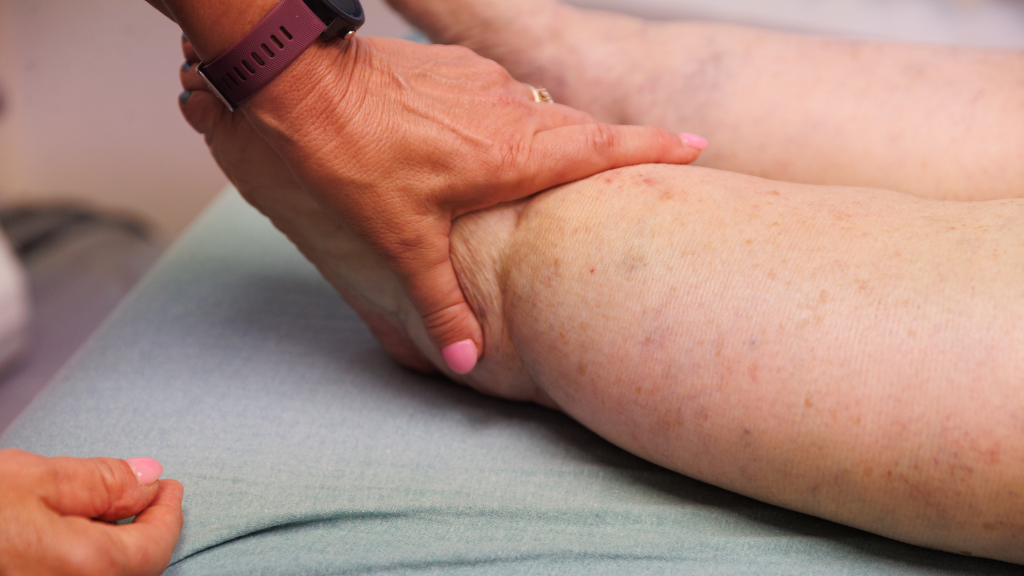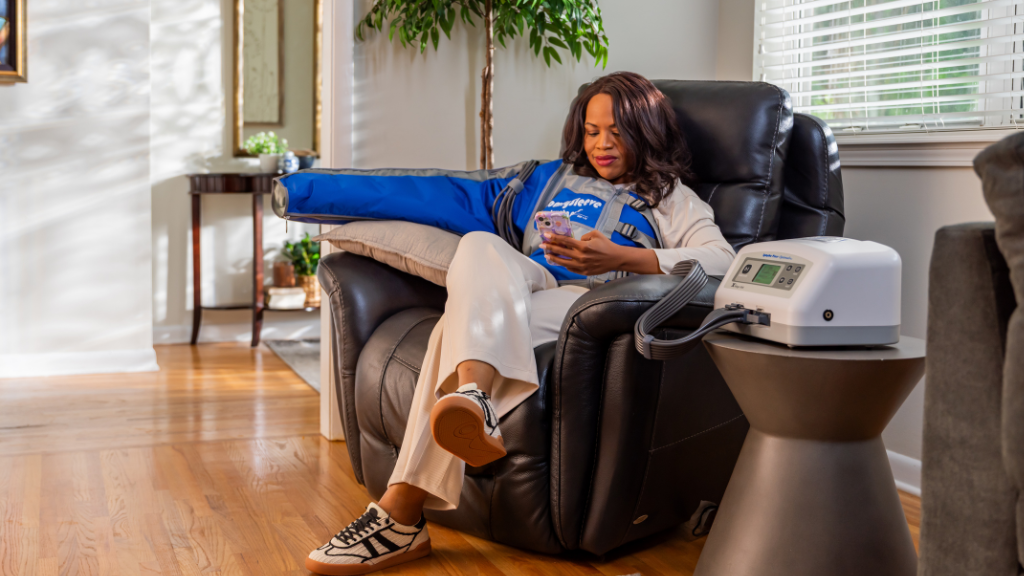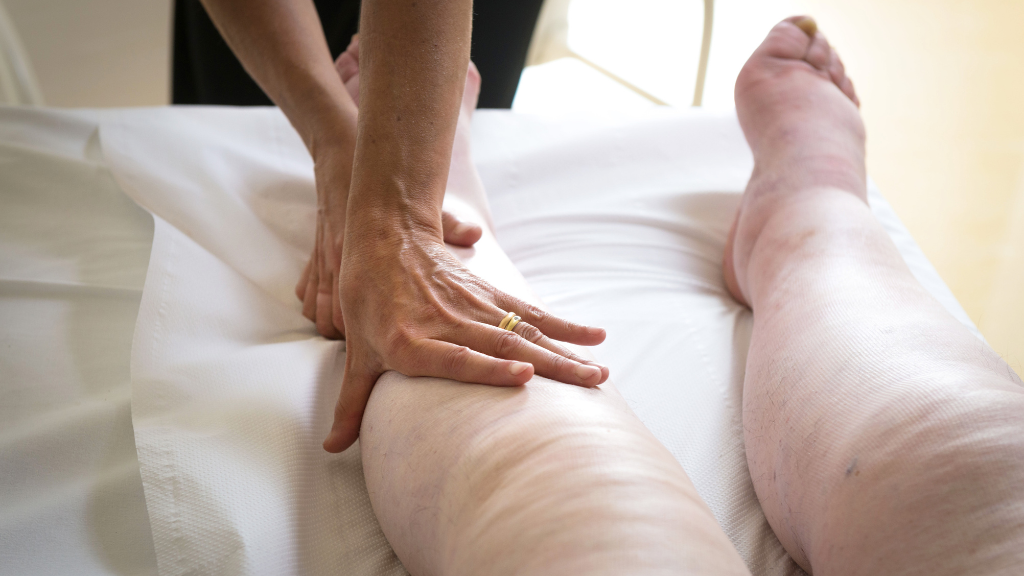
Lymphedema, a condition where lymph fluid builds up in the body’s tissues, can affect more than the swollen areas of your body. Lymphedema can make it difficult to sleep well—and poor sleep can actually worsen lymphedema.
Leslyn Keith, OTD, CLT, explains how sleep and lymphedema affect each other. She offers strategies for better nighttime rest with lymphedema.
Why Sleep Matters in Lymphedema
“Sleep is super important for everybody,” says Dr. Keith. “Someone with lymphedema is going to suffer even more with poor sleep than someone without lymphedema.” Your lymphatic system performs essential work while you’re sleeping. Adequate rest provides the mental and physical energy needed to manage your health effectively.
The quality of your sleep affects your health and life in several ways:
The Benefits of Good Sleep
Good sleep is about more than just having more energy or feeling rested. Dr. Keith says good sleep offers significant benefits, including improved:
- Brain health
- Concentration and decision-making
- Creativity
- Mood and mental health
- Overall health
- Social skills
- Stress levels
The Dangers of Poor or Inadequate Sleep
When you don’t get good sleep, you may face an increased risk of:
- Accidents
- Anxiety and depression
- Health problems such as diabetes, high blood pressure, and heart attack
- Low sex drive
- Poor mental function
- Skin aging and changes due to collagen breakdown
Not getting adequate sleep can also have specific consequences on your brain’s health due to how your brain drains lymph. Poor sleep can make it even more challenging to stick to your lymphedema program and self-care routine.
Sleep and Your Brain’s Lymphatic System
During sleep, your lymphatic system drains inflammatory waste from your brain and spinal cord. However, you need to get quality, deep sleep—and enough sleep—to enable your body to perform this lymphatic cleanout.
“When brain lymphatics are not functioning well, you may not think clearly and develop brain fog,” says Dr. Keith. “Living with lymphedema quite often results in a huge burden of self-care that you have to do daily. When you’re not thinking clearly, some (or a lot) of that daily self-care may fall by the wayside.”
Your brain clears waste during delta sleep, a type of deep sleep essential for lymphatic drainage. “You need at least an hour and a half of deep sleep to allow the lymphatics in the brain to do their work,” says Dr. Keith.
How Lymphedema Affects Sleep
Sleeping well can be challenging for various reasons, including health issues, family, work, stress, and other aspects of life. Living with lymphedema can add additional sleep challenges.
“Studies show that people with lymphedema often have disrupted sleep,” says Dr. Keith. Nighttime disruptions can reduce the amount of deep sleep you experience.
People with lymphedema often report poor sleep due to:
- Difficulty finding a comfortable sleeping position
- Pain from lymphedema
- Sleep-related disorders such as sleep apnea
- Uncomfortable nighttime compression garments
Tips for Nighttime Comfort
Simple changes can lead to improved sleep with lymphedema. Dr. Keith offers tips for better rest:
- Address pain: If nighttime pain keeps you awake, talk to your primary care provider or lymphedema therapist.
- Check your compression: Regularly inspect your nighttime compression garment to ensure it fits and remains comfortable. Your lymphedema therapist can help you with adjustments if needed.
- Create a nighttime ritual: Turn off electronics at least an hour before bedtime, take time to wind down, and keep your bedroom dark and comfortable.
- Exercise earlier in the day: Exercise can be stimulating, so avoiding physical activity later in the day may help.
- Stop caffeine early: Avoid caffeine after noon to prevent it from keeping you awake.
- Take care of your skin: Check your skin carefully and moisturize before bed to reduce itching.
How Lympha Press Helps Sleep Quality
Lympha Press is an intermittent pneumatic compression (IPC) device designed to help manage swelling. It includes a pump connected to a sleeve that fits over the swollen area. The pump inflates the sleeve in a rhythm. The pressure from the pump moves fluid away from swollen areas.
Dr. Keith highlights the benefits of using Lympha Press before bed:
- Fits nicely into a wind-down routine: You can sit and read or watch TV during a Lympha Press session, making it an easy addition to your evening routine.
- Promotes relaxation: Using Lympha Press is relaxing, which can help you unwind in the evening. “It provides a cozy feeling, like a weighted blanket,” she says.
- Reduces swelling and pain: Moving lymph fluid out of swollen areas increases comfort. Decreasing swelling before bed makes nighttime compression even more effective.
When to Seek Help
If you’ve made changes to improve your sleep but are still having trouble, speak with your primary care provider or lymphedema therapist. You may have a sleep disorder, such as sleep apnea, that needs treatment.
Even if you don’t have a sleep disorder, you shouldn’t continue to suffer through bad nights and tired days. “Don’t feel like you have to adhere to your program to your own detriment. Sometimes things are not working the way they should, and you should absolutely trust your instincts,” says Dr. Keith.
If something in your lymphedema management routine is interfering with your sleep, don’t hesitate to seek help. Your lymphedema therapist can help you with adjustments and strategies to improve your sleep.
Discover size-inclusive Lympha Press pneumatic compression garments you can use at home for better sleep and health.






